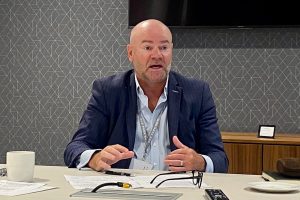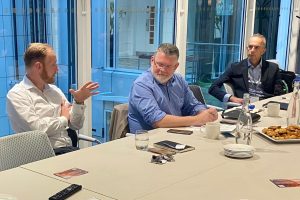Creating a workplace culture that is everyone’s cup of tea

As workplaces continue to adjust and adapt to whatever their own post-pandemic routine has become, culture has been a key part of those decisions about how and when the office is best used.
Connections, collaboration, and social capital can strengthen teams, but their absence can make it harder to create a culture that binds individuals to their employers.
Pervinder Kaur now heads the Leeds office of Addleshaw Goddard, where she has spent her entire career, and so understands how the right culture can keep someone happy as their career develops and through economic cycles.
“The culture of the organisation is fundamental to your enjoyment of your day job,” she said. “What work you’re doing, who you’re working with, how you’re treated, how you’re respected.
“You get up every day, you go to work, you have the demands of general life, and you’re going to a place that you spend a lot of time at – whether you’re working at home, or whether you’re in the office – and it’s that culture that you’ve bought into.”

Pervinder Kaur, Addleshaw Goddard
Speaking at a round table in Leeds, in partnership with Sellick Partnership, Kaur acknowledged that the hundreds of people based at Addleshaw Goddard’s Sovereign Square office are “highly intelligent, talented people who could get a job elsewhere at plenty of law firms”, and salary is only one factor when each individual is thinking about their career.
She said: “Is what I do on a daily basis moving with the world? Is it keeping me challenged? Is it pushing me? Is it getting the best out of me?
“They’re the things that I think have dominated my own career, and I would hope would dominate the thought processes of many of those in my team.”
Acquisitive law firm Knights faces the challenge of finding a cultural fit in two different markets – the big regional cities, which are highly competitive for talent and work, and tertiarty markets, where it is possible to be more dominant – and in two different ways of onboarding people – through individual recruitment and through acquisitions of firms.
Tim Bates, recruitment director at Knights, said: “Fundamentally it comes down to culture as to why someone wants to work here rather than somewhere else, and that actually comes down to a choice that people have.
“But when you acquire businesses, clearly, not everyone does want to work in the way that we work. So there is always going to be a period where some people decide that the environment we are is not for them.
“Whilst we try and get all our acquisitions to be pretty close to us culturally, there is always that element of people that, quite rightly from that perspective, just want to work in a way that’s different to how we work.
“When you have a strong culture, it’s black and white in some ways.”
Although recruitment firms live and breathe the issues with retention and recruitment, it doesn’t necessarily make it easier managing their own teams.

Jo Sellick
Sellick Partnership managing director Jo Sellick said: “The biggest challenge for us is finding the right people, I think the opportunity is if you get your culture right, and you really think about what you want for your employees, you can make a good business.
“We think about our culture constantly.”
Mark Bailey, group director at Sellick Partnership, added: “I think it’s fundamental, where you’re talking about culture, it’s the people you have got interviewing – it’s whether they care and are they bought into the culture that you’ve got, of why that role’s important.
“That’s culture, people that are a reflection of the business, they’re representing the business. Do they actually care? I think if you get that right, your attraction will be better and, if they are an actual reflection of your culture, then your retention is going to be better.”
Allan Tucker, recruitment manager at St Anne’s Community Services, believes their culture, and jobseekers being more interested in the values of their prospective employer, has helped change the make-up of their workforce, which had traditionally leaned towards people wanting to contribute with their skills towards the end of their careers.
“Now, about 45% of our workforce is in the age group 18-25,” he said.
“An unexpected benefit from the pandemic period was people looked at their own perspective on life, and thought money isn’t that important to me, other things are.
“That has really helped us in regards to generating that giving back culture and I think that’s something that has helped us develop better relationships with young people.”

Ben Priestley, Andrew Staples, Tim Bates
Jon Bailey, director of financial planning at Leeds Building Society, finds the simple things can help show people that you have the right culture for them.
“One thing I always do at the end of a job interview is take them through a tour of the office and let them get the buzz of the office, see the writing on the wall and explain it as we’re going around.
“It’s the softer stuff too, such as ‘we held a summer party out there last week and we did this’. The success ratio we have when we do this is nearly 100%.
“Because we also know at the same point whether that person is right for us, and then they know that they want to come because they feel the buzz around the office.”
Ben Priestley is the finance director at Bradford manufacturer Mansfield Pollard, which underwent a management buyout ahead of the first lockdown. The new board made a concerted effort to review the business’s values to create a culture that would underpin strong retention of staff.
He ran through a list of positive things that are now in place – salary increases, healthcare, a gym, employees’ birthdays off, an ESG policy – before revealing the one change that had resonated the most.
He said: “It is the little things that grab people, isn’t it? There are tea and coffee machines around the business and we made them all free.
“That single thing was the thing that made people the most excited – the fact that you can have a cup of tea without paying for it.”









